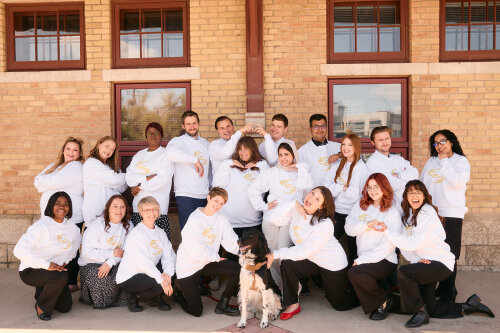Best Class Action Lawyers in Saskatoon
Share your needs with us, get contacted by law firms.
Free. Takes 2 min.
List of the best lawyers in Saskatoon, Canada
Canada Class Action Legal Articles
Browse our 2 legal articles about Class Action in Canada written by expert lawyers.
- Class Action Rights for Consumer Privacy Breaches in Canada
- Most consumer privacy class actions in Canada operate on an opt-out basis, meaning you are automatically included if you meet the class definition. You do not need to pay out-of-pocket legal fees to participate; lawyers are typically paid a percentage of the final settlement or court award. Certification is the... Read more →
- How to Join or Opt-Out of Canada Privacy Breach Class Actions
- Most Canadian provinces operate on an "opt-out" basis, meaning you are automatically included in a class action if you meet the criteria and live in the province where the case was filed. You do not pay any upfront legal fees to participate; lawyers are paid a percentage of the settlement... Read more →
About Class Action Law in Saskatoon, Canada
Class action law in Saskatoon, and broadly in Canada, is a legal mechanism that allows one or several people to file a lawsuit on behalf of a larger group, or "class," of individuals who are in similar circumstances. The purpose of a class action lawsuit is to efficiently resolve claims that might be too small to litigate individually but collectively involve significant legal and financial interests. In Saskatoon, as part of the province of Saskatchewan, class actions are governed by provincial and federal rules. The Saskatchewan Class Actions Act outlines the specific procedural elements and requirements for these cases.
Why You May Need a Lawyer
There are several situations where you might need a lawyer for class action matters in Saskatoon:
- You believe you have been wronged by a company or institution and your situation is shared by a larger group.
- You are approached to join a class action lawsuit and need guidance on your rights and obligations.
- You are considering initiating a class action on behalf of a group and need expertise in evaluating the viability of your claim.
- You are involved in a class action as a defendant and need legal defense against the claims.
Local Laws Overview
In Saskatoon, class actions are primarily governed by the Saskatchewan Class Actions Act. The key aspects include:
- Certification: A lawsuit must be certified as a class action by the court, which involves proving certain prerequisites such as commonality of issues among the class members and suitability of the representative plaintiff.
- Notice: The class must be adequately informed about the class action and given an opportunity to opt-out or participate.
- Settlement: Any proposal to settle a class action must be approved by the court, ensuring that the settlement is fair, reasonable, and in the best interests of the class members.
Frequently Asked Questions
What is a class action lawsuit?
A class action lawsuit is a legal action taken by one or more plaintiffs on behalf of a larger group of people who have similar claims against the same defendant.
How is a class action certified?
Certification involves the court's approval, recognizing the suit as a class action, which includes demonstrating commonality, typically legal or factual, among class members.
Who can be a representative plaintiff?
A representative plaintiff must be a member of the class, have claims or defenses typical of those of the class, and possess the ability and willingness to fairly and adequately protect the interests of the class.
What are the costs involved in a class action lawsuit?
Typically, class action suits operate on a contingency fee basis, where lawyers receive payment as a percentage of the awarded damages. Costs can vary significantly based on the case's complexity.
What does "opting-out" mean?
Opting out allows class members to exclude themselves from the class action. They are free to pursue individual claims but won't benefit from any distributed settlements.
How long does it take to resolve a class action?
Class actions can be complex and lengthy, often taking years to resolve due to the court's involvement in certification, notification, trial, and settlement processes.
Can I start a class action by myself?
While you can initiate the process, class actions involve complex legal and procedural requirements, making attorney guidance crucial for success.
What are the benefits of participating in a class action?
Class actions offer a means to share litigation costs, access legal redress that would be economically unviable as individuals, and collectively force defendants to respond to claims.
How can I find out if a class action affects me?
Notices are typically published in major newspapers, online, and through direct communication for known members. You can also consult legal professionals or follow legal news updates.
What kind of compensation might I receive in a class action?
Compensation varies, including monetary awards, changes in the defendant's behavior, or both, and is determined through negotiation or after a successful trial outcome.
Additional Resources
For those seeking more information on class actions in Saskatoon, the following resources may be helpful:
- The Law Society of Saskatchewan offers resources and lawyer directories specific to class action expertise.
- The Public Legal Education Association of Saskatchewan provides educational materials on legal processes and rights.
- The Canadian Bar Association (Saskatchewan Branch) can provide referrals to legal professionals experienced in class actions.
Next Steps
If you believe you are part of or interested in starting a class action, consider the following steps:
1. Consult with a lawyer experienced in class actions to discuss your situation and evaluate potential claims.
2. Gather any relevant documentation or information that supports the circumstances of the class action.
3. Keep informed about related legal developments through reliable news sources, legal websites, and updates from your counsel.
4. Be proactive in understanding your rights and obligations as a potential class member or representative plaintiff.
Lawzana helps you find the best lawyers and law firms in Saskatoon through a curated and pre-screened list of qualified legal professionals. Our platform offers rankings and detailed profiles of attorneys and law firms, allowing you to compare based on practice areas, including Class Action, experience, and client feedback.
Each profile includes a description of the firm's areas of practice, client reviews, team members and partners, year of establishment, spoken languages, office locations, contact information, social media presence, and any published articles or resources. Most firms on our platform speak English and are experienced in both local and international legal matters.
Get a quote from top-rated law firms in Saskatoon, Canada — quickly, securely, and without unnecessary hassle.
Disclaimer:
The information provided on this page is for general informational purposes only and does not constitute legal advice. While we strive to ensure the accuracy and relevance of the content, legal information may change over time, and interpretations of the law can vary. You should always consult with a qualified legal professional for advice specific to your situation.
We disclaim all liability for actions taken or not taken based on the content of this page. If you believe any information is incorrect or outdated, please contact us, and we will review and update it where appropriate.










